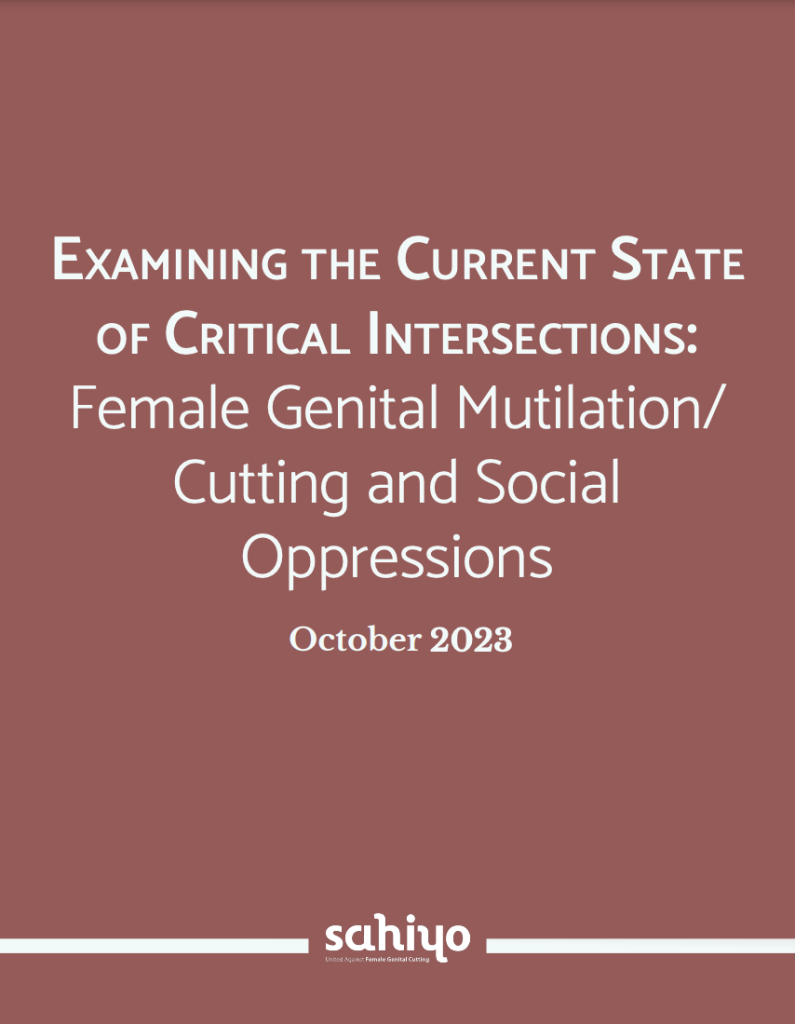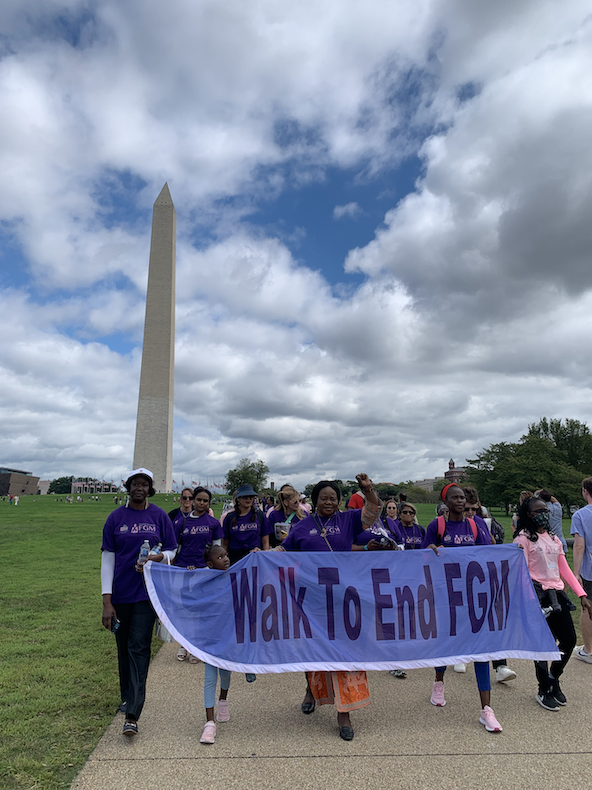PRESS RELEASE: Sahiyo publishes Examining the Current State of Critical Intersections: Female Genital Mutilation/Cutting and Social Oppressions report

Sahiyo U.S. is proud to announce the publication of our new report, Examining the Current State of Critical Intersections: Female Genital Mutilation/Cutting and Social Oppressions. The report explores how different forms of oppression intersect to affect survivors’ access to resources, as well as how the work to end FGM/C is connected to other social justice movements. The inspiration for the report sprung from a webinar that Sahiyo U.S. hosted in July of 2021 titled, “Critical Intersections: Anti-Racism and Female Genital Mutilation/Cutting (FGM/C).” This discussion highlighted how systemic racism negatively affects the work to end FGM/C. The webinar was highly successful, engaging more than 300 people. Using that momentum, with funding from Wallace Global Fund, Sahiyo U.S. launched a research project to further understand how different forms of oppression affect marginalized communities that practice FGM/C, and how to connect with other social justice movements to strengthen efforts in ending FGM/C. The report breaks down how the following themes, and how they intersect with the harmful practice of FGM/C: Religion: FGM/C occurs within many different religious communities, yet a focus on Islamic communities falsely correlates the practice with this religion, negatively impacting women and survivors of FGM/C with an Islamic background and furtherheightening Islamaphobia. Race: common assumptions about FGM/C are often based on racist stereotypes. Type III FGM/C (infibulation) is often called “African FGM/C,” while less severe types of FGM/C such as Type I (clitoridectomy) and Type II (excision) are associated with Asian countries. This racialized distinction can be used to justify the practice by some FGM/C practicing communities Bodily Autonomy: there is great potential for collaboration between anti-FGM/C work and the #MeToo movement. Violations of survivors’ bodies at an age where they do not fully understand how their body functions inhibits their ability to assert bodily autonomy; similarly, survivors of the #MeToo movement lost autonomy over their bodies through experiences of sexual violation. Queer Gender and Sexuality: the practice of FGM/C itself forces survivors to comform to cisgender and heteronormative ideas of what a woman is. LGBTQ+ survivors are underrepresented in statistics and the FGM/C activist community, and face an intersection of barriers that causes erasure from the FGM/C sphere. Feminism: there are many complexities at the intersection of FGM/C and feminism. Both the resister and accommodator of FGM/C may argue that their actions are aligned with Feminist philosophy based on their reasoning. Law and Policy: In the U.S., state laws on FGM/C have been co-opted to ban gender-affirming healthcare for minors. Globally speaking, law and policy has led to the criminalization of FGM/C, creating opportunities for ending of the practice, or giving practitioners reason to continue it in secrecy. Climate Change: marginalized groups are more adversely affected by the climate crisis because they do not have economic resources to protect themselves. This puts financial strain on these communities, and makes women and girls more susceptible to oppression and violence, including FGM/C. It is our hope that this report will support advocates working in FGM/C to better understand how these intersecting oppressions affect the work to end FGM/C and survivors, and connect fellow activists and social change makers to unite in ending universally oppressive systems. Read the full report here. Learn more about the Critical Intersections Research Project.
My experience at the Global Woman Awards and Walk to End FGM

By Rachel Wine On September 30th, I had the honor of joining survivors, activists, and allies from around the world to participate in the 9th Annual Global Woman Awards the 10th Annual Walk to End FGM. I was grateful for the opportunity to meet with my peers in the anti-FGM/C field in-person, and share in the collective energy that is fueling the work to end this harmful practice. The ceremony kicked off with a musical performance, a keynote speaker, and opening remarks by the Global Woman P.E.A.C.E Foundation’s founder, Angela Peabody. The award ceremony began with the category of legal and policy work in the anti-FGM/C field; this year’s awardee was our very own Mariya Taher! Though Mariya was unable to attend the event in-person, I was excited to celebrate the recognition of her hard work and share some remarks on her behalf. I was eager to tell the crowd about Sahiyo’s work as Coalition members in Massachusetts, Washington, and Connecticut, and the successes of passing legislation in the former two states. I explained that passing legislation is only half the battle, and the other half is holding legislators accountable for upholding the law. I also emphasized the importance of holistic approaches to ending FGM/C, such as educational initiatives and programs for survivors. After accepting the award on Mariya’s behalf, I was delighted to hear about the accomplishments of the other awardees, including an educator, doctors, survivors, students, and more. I felt hopeful for the future of this work seeing many young activists in the crowd. When the award ceremony ended, the group gathered to walk from the Washington Monument to the Lincoln Memorial and back, united in chanting “No More FGM!” Many patrons of the National Mall stopped us to ask what FGM stood for; we shared pamphlets and information to educate them, and hopefully fueled their curiosity to learn more. As we sat on the steps of the Lincoln Memorial chanting, clapping, stomping, and cheering, I was reminded of the power of being a part of something bigger than myself. This event was something I won’t soon forget, and I’ll look forward to many future celebrations of our work to end FGM/C.
